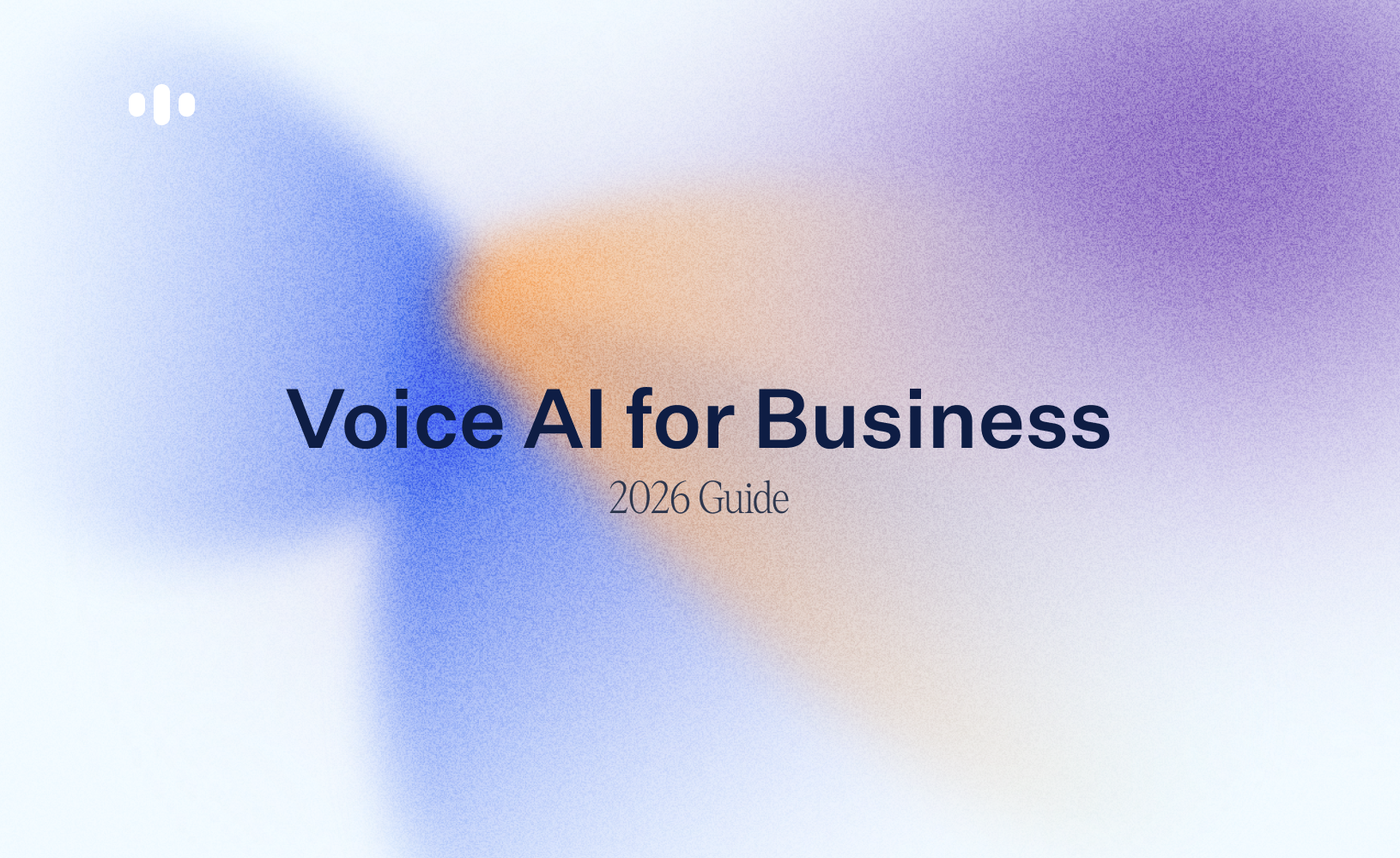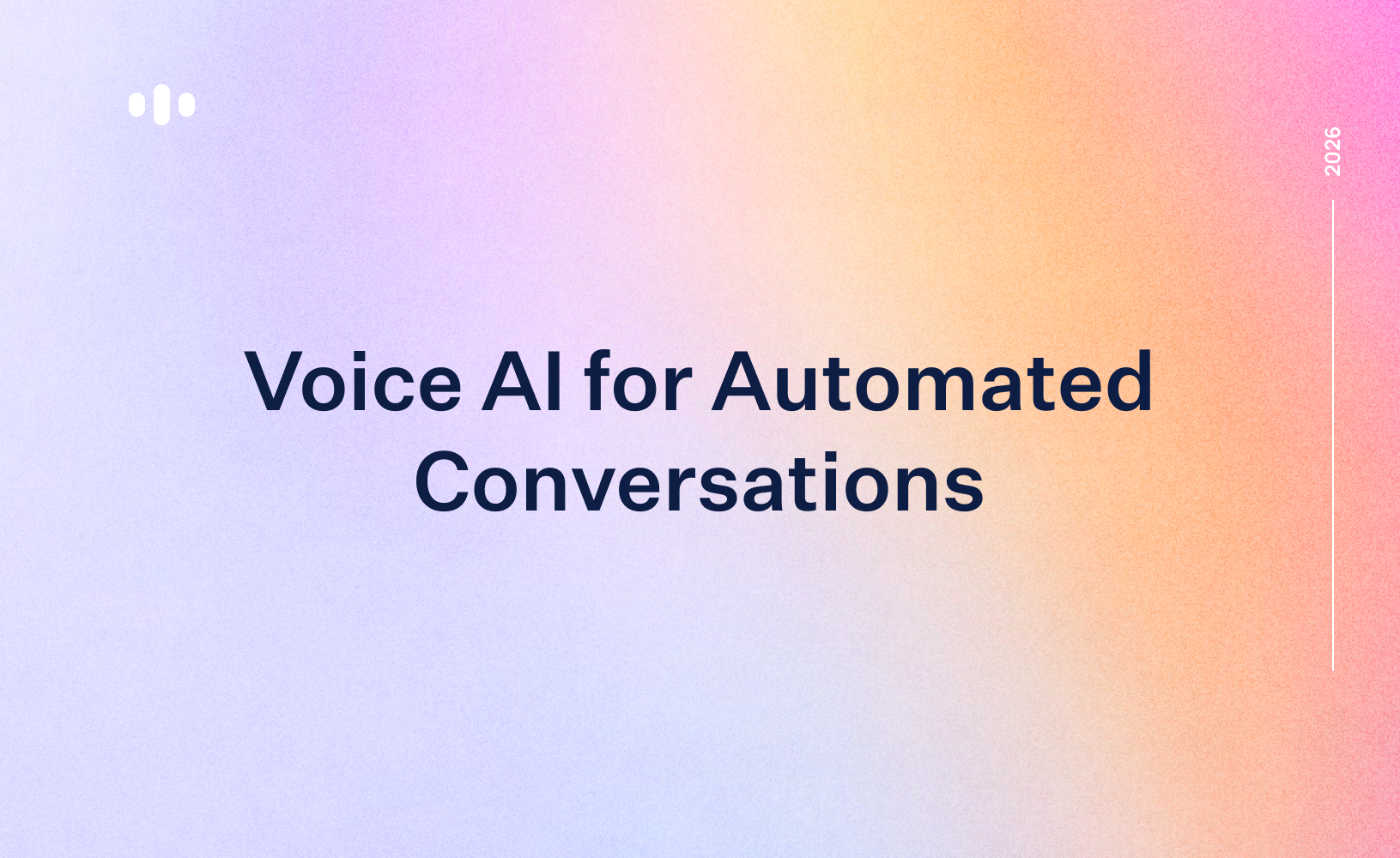PolyAI has become a go-to name for enterprise-grade voice assistants, prized for lifelike conversations, robust contact-center integrations, and global language coverage. Within the broader conversational ai landscape, PolyAI stands out as a leading solution, but there are many poly ai alternatives that offer different features, scalability, and pricing models for businesses of all sizes.
If you’re running large volumes and care about brand-safe, natural voice at scale, it’s easy to see the appeal. Still, many teams now evaluate options that move faster to value, expose more self-serve controls, or offer simpler, usage-based pricing.
In this article, we’ll unpack what PolyAI does well and help you find the best poly ai alternative for your needs, depending on your goals around speed, transparency, and developer control.
What is PolyAI?
PolyAI is a conversational AI platform that builds customer-led voice assistants for enterprises, capable of fielding and resolving complex calls across industries like banking, hospitality, insurance, retail, and telecom.
Their platform leverages advanced AI models and natural language processing to deliver lifelike, human-like conversations. PolyAI's natural language understanding capabilities enable it to interpret and respond to complex customer inquiries. The platform emphasizes natural, interruption-friendly conversations (“barge-in”), multilingual support (45+ languages), and contact-center use cases such as authentication, billing, bookings, and payments.
On the trust side, PolyAI highlights SOC 2 Type II and ISO 27001, plus a per-minute pricing model that includes ongoing improvements, maintenance, 24/7 support, and a 99.9% phone-line SLA.
Why Teams Look Beyond PolyAI for Customer Satisfaction
Even with strong conversational quality and enterprise guardrails, buyers often explore alternatives when they need a different trade-off profile:
- Speed to value & iteration: PolyAI showcases production launches in weeks. Teams chasing day-scale iteration or more self-serve build cycles sometimes prefer developer-first or no-code tools that optimize for rapid testing and rollouts.
- Pricing transparency: PolyAI prices usage on a per-minute basis with support and improvements included, but public rate cards aren’t listed, evaluation typically runs through a demo/sales cycle. Some teams favor vendors with fully published, granular $/min components. Others may require custom pricing tailored for enterprise or large-scale deployments.
- Enterprise-oriented governance: The platform’s enterprise posture is a plus for many, yet certain advanced features and betas require coordination with PolyAI (e.g., rep-gated programs), which can add process compared to fully self-serve stacks.
- Tooling preferences: If your priority is a code-heavy, API-first toolkit or a lightweight no-code builder for non-technical owners, you may find alternatives that better match your team’s working style while still delivering strong voice quality. Some alternatives require less technical knowledge, making them accessible to a wider range of users.
- Developer control: Teams seeking advanced modularity or integration may look for platforms that offer deep customization options for engineering teams with advanced needs.
Teams may also seek alternatives with enhanced ai capabilities tailored to their specific requirements.
PolyAI Alternatives Compared: Leading Voice AI & Conversation Platforms (2026)
This table compares PolyAI with several voice and conversational AI platforms that teams often evaluate in 2026, summarizing key differences in use cases, usability, conversation approach, pricing visibility, and adoption.
| Platform | Best For | Ease of Use | Conversation Quality | Pricing Transparency | Market Adoption |
|---|---|---|---|---|---|
| Retell AI | Production voice automation with phone-centric workflows | Moderate (mix of low-code and APIs) | Designed for real-time, natural voice interactions | Clear usage-based pricing available | Widely used for voice automation use cases |
| PolyAI | Multilingual, enterprise contact-center voice agents | Moderate to complex | Context-aware, interruption-friendly conversations | Pricing typically via sales cycle | Recognized enterprise voice AI platform |
| Synthflow AI | No-code voice workflows and rapid deployment | Easy (visual workflow builder) | Good for structured interactions | Published pricing | Growing among SMBs and automation teams |
| Replicant | Contact-center automation with integration support | Moderate | Good for structured conversational support | Not publicly listed (enterprise contracts) | Used in larger contact-center environments |
| Cognigy | Omnichannel enterprise conversational automation | Moderate to complex | Designed for multi-channel interactions | Enterprise pricing (custom) | Strong in enterprise CX automation |
| Kore.ai | Intelligent assistants across voice, chat, and channels | Moderate to complex | Good multilingual and NLP support | Tiered plans, custom at higher tiers | Adopted by global enterprises |
| Sierra AI | Brand-aligned conversational automation with action capabilities | Moderate | Focused on personalized conversations and context | Custom pricing | Positioned for sophisticated deployments |
| Voiceflow | No-code conversational design across voice and chat | Easy | Quality depends on configuration | Transparent pricing tiers | Popular among no-code builders |
| ElevenLabs | High-quality text-to-speech and voice generation | Easy | Known for strong voice realism | Publicly available pricing | Widely used for voice quality and branding use cases |
Top PolyAI Alternatives in 2025
1. Retell AI
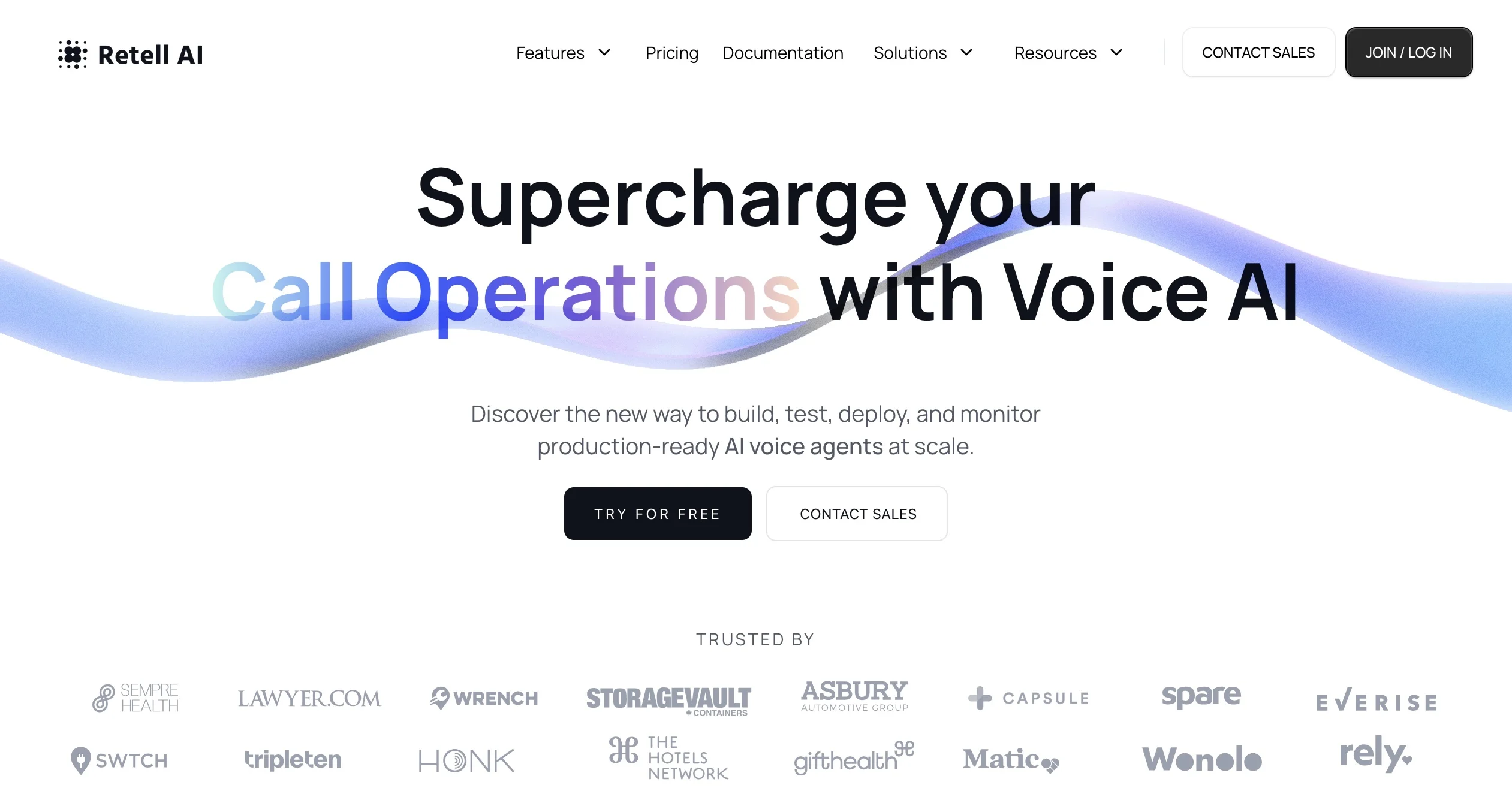
Retell AI is one of the top alternatives to PolyAI, and is considered among the leading conversational ai platforms for building AI voice agents.
Retell offers a developer-friendly platform with a drag-and-drop interface for quickly building, deploying, and monitoring AI voice agents. It supports advanced LLMs, multilingual voice models, real-time workflows, and integrations with telephony providers like Twilio. Some platforms, including Retell, offer industry specific solutions tailored to sectors like healthcare, finance, or retail.
These features can help expand your reach by supporting multiple languages and broader user engagement across various communication channels.
For a clear overview, see the table below summarizing key features and use cases of each alternative, including cost-effective options and their benefits. Retell also includes pre-built templates for common use cases like lead qualification, appointment booking, AI receptionists, and customer support. These platforms are designed to enhance customer engagement across multiple communication channels.
Advantages Compared to PolyAI
Retell AI excels in areas like low-code infrastructure, rapid deployment, and easy integration, making it stand out for teams looking to quickly implement voice AI solutions.
- Transparent pricing: Retell follows a clear, pay-as-you-go model with no hidden enterprise fees, so teams can easily forecast costs without long negotiations.
- Faster iteration: You can design, test, and deploy new agents in hours instead of weeks. Retell’s lightweight builder shortens the feedback loop dramatically.
- Voice-first architecture: Built from the ground up for real-time phone conversations, Retell delivers sub-second latency and natural turn-taking that feels human.
- Self-service control: Unlike PolyAI’s managed deployments, Retell gives you a low-code and API-friendly environment so your team stays in control of updates and logic.
- Flexible telephony: Retell integrates with SIP, Twilio, and custom carriers (BYOC), while PolyAI typically runs through managed enterprise lines.
- Webhook and API automation: Every call event can trigger real-time actions through webhooks, perfect for CRM updates, scheduling, or lead follow-ups. Retell's tool calling functionality enables seamless integration with other tools, allowing developers to automate processes and enhance voice experiences.
- Transparent analytics: All conversations are automatically transcribed and summarized, giving teams full visibility into intent, duration, and outcomes. Retell also provides real time analytics for monitoring and improving performance.
- Integrations: Retell can connect with existing systems to streamline workflows, ensuring compatibility with your current infrastructure. Its integrations help keep customer data up to date across platforms, supporting scalable solutions and improved customer engagement.
- Predictable performance: Sub-second latency and auto-scaling infrastructure ensure smooth operation even during high-volume campaigns.
Pricing
Retell is among the cheapest options for enterprise-grade voice AI. Pay-as-you-go starts at $0.07+ per minute, with volume discounts down to $0.05/min for enterprise plans. For organizations with unique requirements, custom pricing is available to ensure flexibility and tailored solutions beyond standard tiers. You are charged only for connected calls, not for idle time. The base price covers core voice AI services, while the rest of the costs include telephony and advanced large language models. Free $10 credit and limited concurrent calls are included for testing.
Number rental is only $2 per month, and toll-free numbers are only $5 per month.
G2 Rating: 4.8/5 (612 reviews)
Review: “Retell AI has completely transformed the way we manage automated calls, with impressive voice quality and understanding”.
Recommended for:
Product teams and enterprises seeking a scalable, flexible voice AI platform that can be tailored to specific business needs, with transparent pricing, especially those focused on call centers and outbound sales automation, will find Retell a strong choice. Retell is also suitable for smaller businesses and small businesses seeking scalable solutions. The platform supports ai powered call centers and ai powered voice agents for efficient, human-like customer service.
Build your first Retell agent in minutes for free.
Pros
- Purpose-built for real-time voice AI automation with sub-second latency, enabling natural, human-like turn-taking on live customer calls.
- Transparent, pay-as-you-go pricing with no hidden enterprise licensing fees, making cost forecasting predictable for growing teams.
- Developer-friendly platform with a low-code builder, APIs, webhooks, and flexible telephony integrations that accelerate production deployment.
2. Synthflow
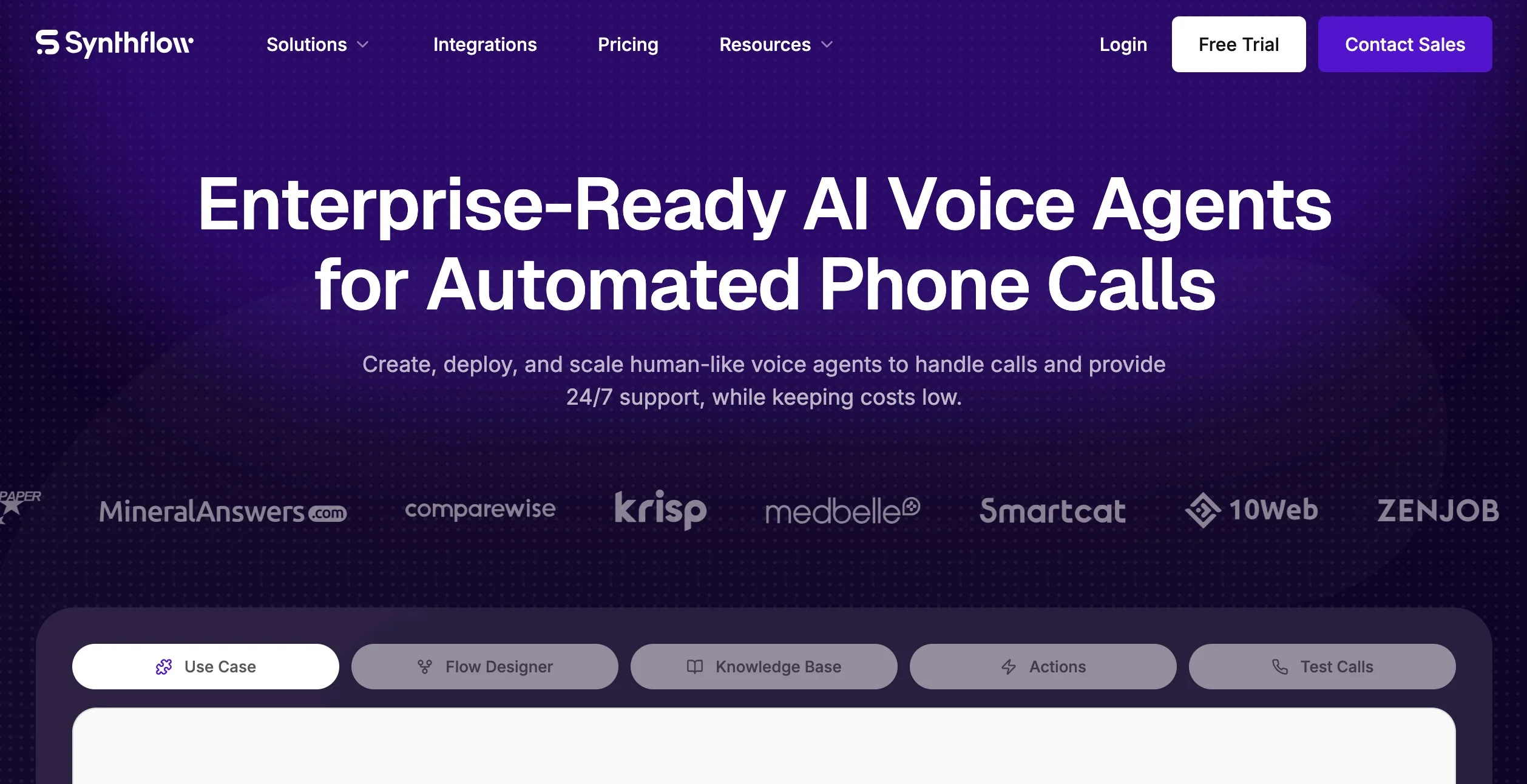
Synthflow is a scalable voice AI with a no-code visual workflow builder, real-time personalization, and deep CRM integrations. Supports HIPAA compliance, inbound routing, and multi-tenant management for agencies. Designed for production-grade voice automation.
Advantages Compared to PolyAI
- No-code simplicity: Synthflow lets you build and deploy voice agents with a drag-and-drop interface, eliminating the need for a dedicated engineering team, a major contrast to PolyAI’s enterprise-grade setup.
- Faster setup and iteration: Teams can launch pilots in a matter of days using pre-built templates and test flows, while PolyAI implementations typically require longer onboarding cycles.
- Transparent pricing: Synthflow publicly lists its pay-per-minute rates (~$0.08/min), making it easier for smaller teams to forecast costs compared to PolyAI’s custom enterprise quotes.
- Rich voice customization: With built-in voice cloning, tone control, and multilingual options, Synthflow allows greater creative flexibility for brand-aligned voice experiences. The platform also enables multi turn conversations and natural conversations, delivering human like conversations and ensuring conversations feel natural for users.
- Accessible for smaller teams: While PolyAI targets large contact centers, Synthflow’s self-service model makes advanced voice automation achievable for startups and mid-sized businesses.
These features contribute to higher customer satisfaction.
Pricing
The starter plan is one of the cheapest options for entry-level users, starting at $29/month for 5,000 minutes and 1 agent. The Growth plan at $99/month includes 20,000 minutes and unlimited agents. The Scale plan at $249/month supports 60,000 minutes. For large-scale deployments, custom pricing is also available to accommodate unique enterprise needs.
G2 Rating: 4.5/5 (815 reviews)
Review: “What I like best about Synthflow is that it doesn’t bury you in technical complexity. You don’t need to be a coder or spend weeks wiring together APIs just to get a usable AI voice agent”.
Recommended for
Marketing teams and enterprises with specific business needs in compliance and automation, as well as those requiring robust inbound support automation and deep integrations. E commerce businesses seeking advanced automation will also find Synthflow a strong choice, as it offers tools for customer sentiment and customer sentiment analysis to improve service quality.
Synthflow is a scalable voice AI with a no-code visual workflow builder, real-time personalization, and deep CRM integrations. Supports HIPAA compliance, inbound routing, and multi-tenant management for agencies. Designed for production-grade voice automation.
Pros
- No-code visual workflow builder allows non-technical teams to design, test, and deploy voice AI agents without engineering support.
- Publicly available pricing with predictable usage-based rates helps startups and SMBs estimate voice automation costs accurately.
- Built-in voice cloning, tone control, and multilingual support enable consistent, brand-aligned conversational experiences.
Cons
- Usage-based, per-minute pricing can become expensive as call volumes scale.
- Primarily focused on voice AI, with limited native support for broader omnichannel orchestration.
- Complex backend integrations may still require developer involvement.
3. Replicant
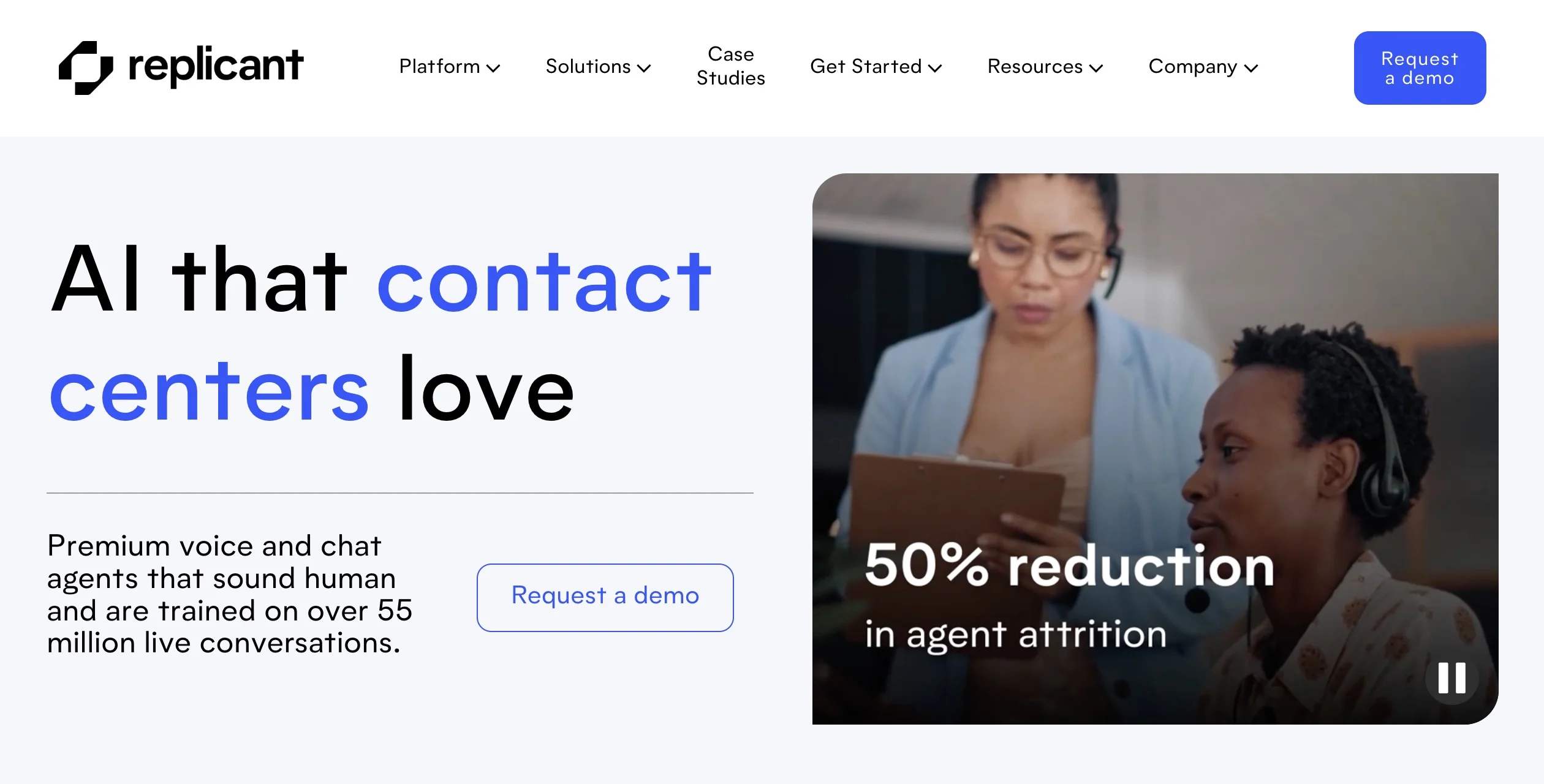
Replicant is an enterprise-grade automation platform for contact centers.
Its “Thinking Machine” resolves Tier-1 customer calls autonomously (a foundation for robust AI answering services), escalates to live agents when needed, and integrates with backend systems to complete workflows. The platform includes analytics and conversation intelligence tools for optimizing performance at scale.
Advantages Compared to PolyAI
- Faster deployment with built-in templates & managed setup: Replicant advertises the ability to deploy use cases in “weeks, not months,” leveraging pre-built conversational components to shorten ramp time.
- Virtual agents for full conversation automation + conversation intelligence loop: Replicant’s virtual agents automate customer service by handling customer conversations and customer interactions end-to-end. Built-in analytics and QA on every call convert these interactions into insights and improvements without needing separate tools. Sentiment analysis is used to optimize performance and enhance the quality of customer experiences.
- End-to-end autonomous handling of Tier-1 calls: It’s designed to resolve routine, high-volume requests (e.g. billing, scheduling, FAQs) without human handoff when possible, reducing load on live agents.
- Seamless escalation & context preservation: When a call needs human intervention, Replicant’s handoff maintains full conversational context so the user doesn’t need to repeat or reauthenticate.
- Strong integration compatibility & infrastructure fit: Many reviewers note that Replicant integrates well into existing contact center and telephony stacks (CRMs, CCaaS platforms) without requiring full rip-and-replace, which helps reduce disruption during adoption.
Pricing
Replicant does not publish pricing publicly. Engagements are structured as enterprise contracts, tailored to call volumes and complexity.
G2 Rating: 4.7/5 (45 reviews)
Review: "The team is quick to reply if there are any technical concerns and is open to feedback. They usually respond within an hour when a ticket is sent in".
Recommended For:
Large-scale contact centers that want to automate high call volumes end-to-end, with the support of an established vendor in the voice automation space.
Pros
- Designed specifically for end-to-end Tier-1 customer support automation, handling routine inbound calls autonomously.
- Built-in analytics and conversation intelligence provide actionable performance insights without third-party tools.
- Preserves conversation context during live agent escalation, reducing customer repetition and authentication friction.
Cons
- Pricing is not publicly disclosed and typically requires enterprise-level contract negotiations.
- Best suited for large contact centers rather than early-stage pilots or mid-market experimentation.
- Limited flexibility for omnichannel workflows beyond voice automation.
4. Bland
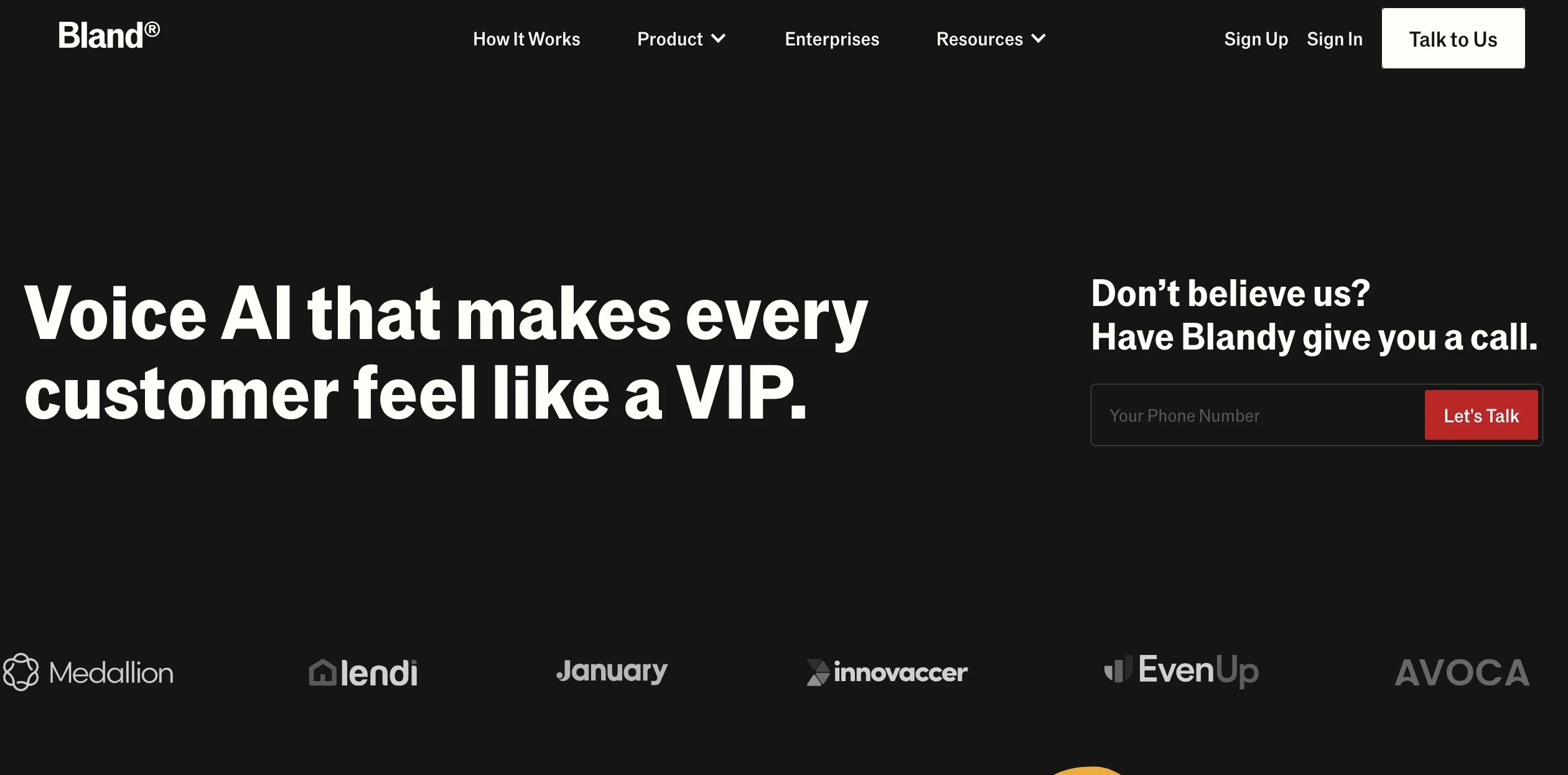
Bland emphasizes hyper-realistic voice experiences with strong security and data governance. It supports high-volume inbound and outbound calling, SMS, and omnichannel workflows, making it ideal for AI telemarketing operations that handle thousands of personalized calls daily.
Bland markets itself as capable of scaling up to one million concurrent calls, making it attractive to enterprises that demand resiliency.
Advantages Compared to PolyAI
- No-code conversational pathways: Bland offers a visual, drag-and-drop builder for designing voice agents, so business users can create and tweak agents without heavy development.
- Strict data governance & security: Bland lets you host on dedicated infrastructure, encrypt data in region, and maintain tight control over models and IP. This can provide more confidence for regulated industries.
- Omnichannel voice + SMS + chat: Beyond voice, Bland agents can also handle SMS, conversational chat, and support AI chatbots in addition to voice agents, enabling unified experiences across multiple channels.
- Real-time integrations and context carryover: During calls Bland can call webhooks, pull from CRMs or back-end systems in real time, and carry conversational memory (context) across turns and sessions.
- Built-in analytics, sentiment & call scoring: Bland includes features like emotion detection, confidence scoring, call summarization, and full logging/observability out of the box—tools that Sierra would likely require you to build or layer.
Bland's unified approach helps engage customers across all channels, improving customer engagement and satisfaction.
Pricing
No public pricing. Bland generally positions itself at the enterprise tier, with costs reflecting its scale and customization focus.
Product Hunt Rating: 3/5 (10 reviews)
Best for:
Large enterprises with strict requirements for privacy, governance, and brand voice customization at scale.
Pros
- Visual, no-code builder simplifies the creation and management of voice AI agents and conversation flows.
- Strong focus on security, data governance, and enterprise-grade hosting for regulated industries.
- Supports omnichannel engagement across voice, SMS, and chat, with sentiment analysis and reporting.
Cons
- Lack of transparent pricing makes cost comparison and budgeting difficult.
- Positioned primarily for enterprise customers, which may limit accessibility for smaller teams.
- User feedback and maturity vary compared to longer-established platforms.
5. Cognigy
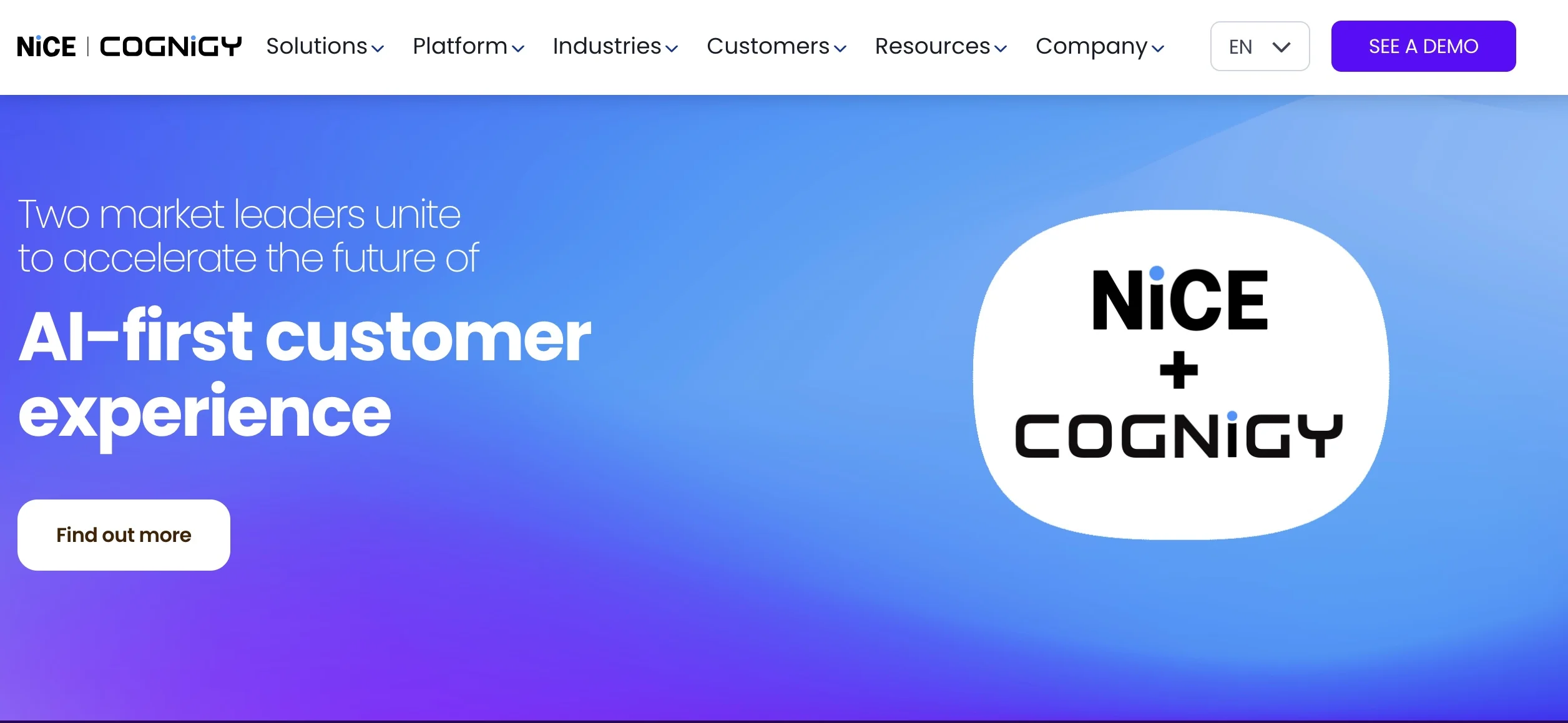
Cognigy is a conversational automation platform built for complex, enterprise-grade deployments.
It supports voice and chat channels, advanced orchestration, multilingual interactions, and customizable workflows, perfect for AI IVR deployments that need deep backend orchestration and multilingual routing.
Advantages Compared to PolyAI
- Omnichannel automation: Cognigy goes beyond voice, it connects seamlessly across chat, web, messaging apps, and telephony. For teams running multi-channel support or marketing automation, that broader orchestration is a big plus over PolyAI’s voice-only focus.
- Visual low-code builder: Its node-based design interface makes it easier to build complex conversational flows without deep coding, giving non-technical teams more autonomy.
- Deep enterprise integrations: Cognigy comes with native connectors for CRMs, ticketing, and backend systems, so you can plug automation directly into your existing stack instead of rebuilding everything from scratch.
- Flexible deployment options: Whether you need SaaS, private cloud, or on-premises, Cognigy supports all three, a major advantage for industries with strict data residency or compliance requirements.
- Scalable and logic-rich workflows: Cognigy handles high call and chat volumes while supporting hybrid logic (LLMs + rule-based). That flexibility makes it ideal for enterprises managing complex service scenarios, and it enables the creation of custom ai agents tailored to specific business needs.
Cognigy leverages generative ai and advanced natural language processing to deliver more human-like interactions, better context understanding, and improved customer support.
Pricing
Enterprise licensing, typically customized to deployment scale and channel usage. Custom pricing is available based on deployment scale and requirements. Pricing is not publicly listed.
G2 Rating: 4.6/5 (13 reviews)
Review: “Overall I loved it but I must mention that it does not support an extensive workflow”.
Recommended For:
Global enterprises with complex workflows, multiple channels, and a need for deep orchestration across languages and regions.
Pros
- Enterprise-grade conversational AI platform supporting voice, web chat, and messaging from a single system.
- Low-code drag-and-drop builder with native backend connectors enables complex automation workflows.
- Flexible deployment options, including SaaS, private cloud, and on-premises, support data residency requirements.
Cons
- Custom pricing model can slow evaluation and procurement cycles.
- Initial setup and learning curve are steeper than pure no-code solutions.
- Advanced workflow abstraction may be challenging for highly complex use cases.
6. Kore.ai

Kore.ai provides a platform for building intelligent virtual assistants across voice, chat, email, and social media.
Its low-code design tools, built-in NLP, and analytics capabilities make it a versatile option for teams that want to reduce engineering lift while maintaining enterprise-grade functionality.
Advantages Compared to PolyAI
- Mature omnichannel & internal workflows: Kore.ai is built for broader conversational automation: chat, messaging, forms, employee/self-service bots, providing the foundation for hybrid AI call center environments that blend automation with live agent collaboration. Kore.ai enables multi turn conversations for more complex interactions, and if your roadmap includes non-voice touchpoints, Kore gives more out of the box.
- Deployment flexibility: Kore.ai supports both cloud (SaaS) and on-premise or private cloud deployments, which is a major plus for organizations with strict data residency, regulatory, or infrastructure requirements.
- Proven enterprise scale & governance: With long tenure in the enterprise space, Kore.ai provides features like role-based access control, versioning, advanced logging, audit trails, and governance layers that many customers trust for large, regulated environments.
- Rich NLP tooling & multi-language support: Kore.ai’s conversational AI tooling includes fine-grained control over intent design, entity extraction, dialogue contexts, and supports many languages, giving you more control to tune your system than more voice-centric platforms.
- Full lifecycle support for bots & virtual assistants: Kore.ai offers a full stack: from design, training, testing, deployment, feedback loops, and monitoring across all conversational modalities, meaning you don’t have to stitch together multiple tools when scaling beyond voice. For integrations, Kore.ai helps manage customer data across platforms.
Pricing
Kore.ai offers tiered plans (e.g. Essential, Advanced, Enterprise), where only the top tier is custom-priced. For large deployments, custom pricing is available to accommodate unique business requirements.
They also charge for model compute via “model credits” as part of infrastructure usage. For large deployments, especially in voice or agentic AI, pricing is negotiated case by case, with usage, concurrency, channel mix, and features all influencing the final quote.
G2 Rating: 4.3/5 (12 reviews)
Review: “User friendly, fast and many supported languages. Very complex setup process and more bugs then competitors”.
Recommended For:
Organizations that need a balanced multichannel solution with lower setup overhead and strong low-code capabilities.
Pros
- Comprehensive conversational AI platform spanning voice, chat, email, and social channels with strong governance controls.
- Advanced NLP capabilities and multilingual support enable more accurate and contextual conversations.
- Flexible deployment models support compliance needs in regulated enterprise environments.
Cons
- Tiered pricing and usage credits can complicate cost forecasting.
- Longer implementation timelines due to platform depth and configuration requirements.
- May be overly complex for small teams or voice-only automation needs.
7. Sierra AI

Sierra AI deploys advanced AI agents for customer service that are uniquely trained to align with a company's specific brand identity.
These agents can reason, predict, and take action not just based on a knowledge base, but also by adhering to the company’s tone, values, and policies for a highly personalized interaction.
Advantages compared to PolyAI
- Agent action & system integration out of the box: Sierra agents don’t just converse, they can trigger actions (update a CRM, manage orders, adjust subscriptions) seamlessly, reducing the need for custom middleware. Sierra also manages customer conversations and customer interactions across channels, ensuring high-quality engagement at every touchpoint.
- Natural, interruption-aware voice: Sierra’s voice capabilities manage real-time interruptions, noise, and side conversations more gracefully, giving a more human feel to phone calls.
- Omnichannel consistency via Agent OS: Build once, deploy across voice, chat, SMS, email, Sierra keeps the brand voice and context aligned across channels.
- Guardrails, auditing, and introspection: Sierra includes built-in quality assurance, audit trails, and controlled logic so you can see why the agent responded a certain way.
- Speed to live + value orientation: Sierra positions itself for deployment in weeks (not quarters), reducing the burden of orchestration, fallback logic, and iteration overhead.
- Seamless escalation: Sierra enables seamless handoff to human agents when needed, ensuring complex or sensitive customer interactions are handled appropriately.
Sierra offers a strong balance between automation and human support, with AI designed to manage many tasks that could potentially ai replace those traditionally handled by human agents, while still allowing for escalation to human staff when necessary.
G2 Rating: 4.3/5 (12 reviews)
Review: “User friendly, fast and many supported languages. Very complex setup process and more bugs then competitors”.
Pricing
Sierra’s pricing begins at approximately $150,000 annually, making it a more cost-effective alternative for sophisticated AI.
Final pricing is custom pricing, determined based on agent complexity and expected interaction volume. This structure provides a lower total cost of ownership compared to Kore.ai while delivering powerful, brand-aligned automation.
Recommended for:
Customer-centric brands where a consistent voice and adherence to company policy are critical, especially in telecommunications and financial services managing diverse customer segments.
Pros
- Brand-aligned AI agents designed to reason, predict outcomes, and take action across customer touchpoints.
- Built-in quality controls, audit trails, and policy enforcement ensure consistent enterprise-grade interactions.
- Interruption-aware voice and seamless escalation create more natural customer experiences.
Cons
- Higher entry cost and custom pricing model primarily target enterprise customers.
- Implementation complexity exceeds that of self-serve or no-code tools.
- Best suited for established customer support operations rather than rapid experimentation.
8. Voiceflow
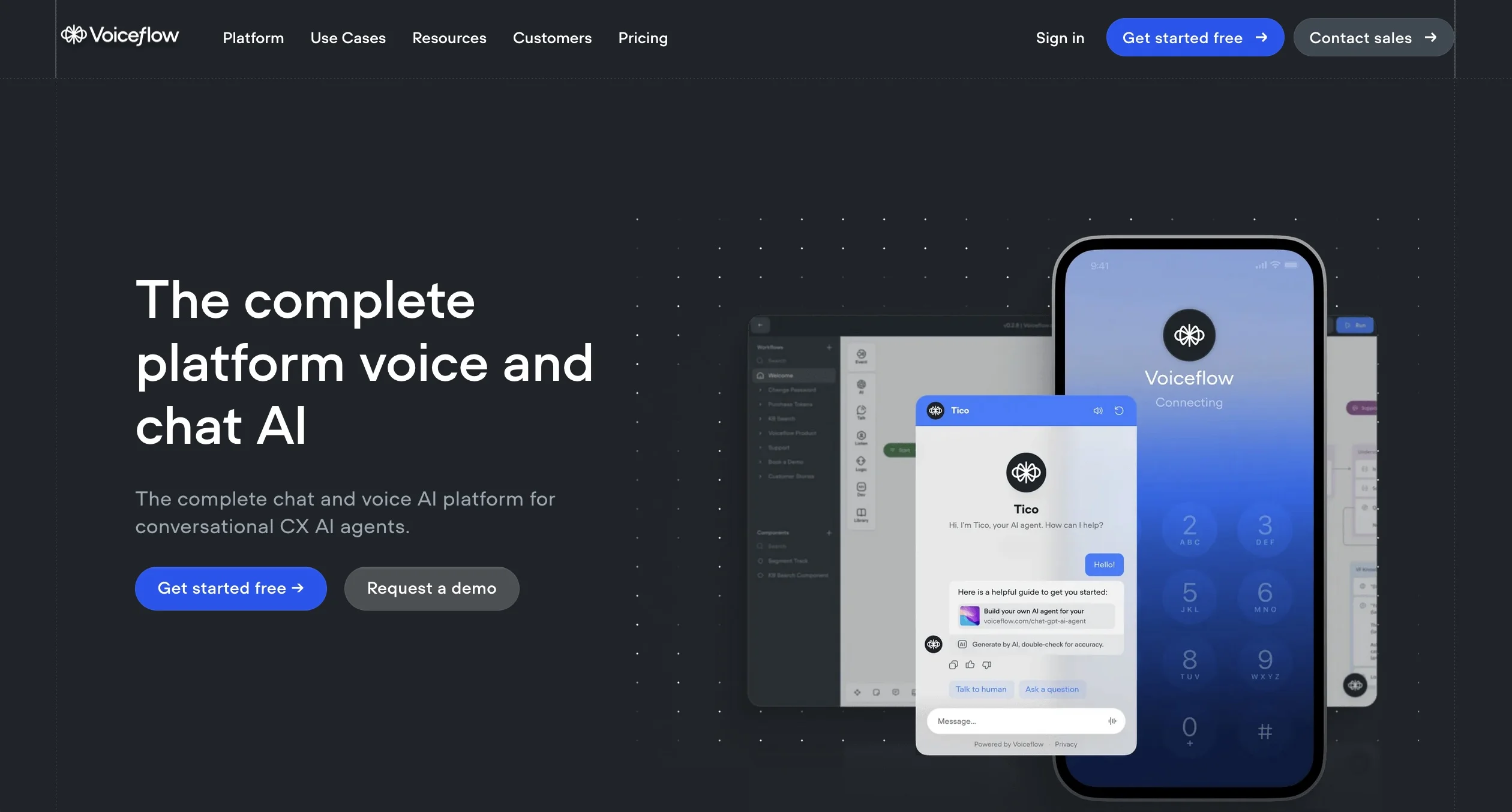
Voiceflow is a leading no-code platform for designing conversational workflows across both voice and chat.
It excels in prototyping and collaboration, allowing teams to co-design flows, manage knowledge bases, and test experiences before launch.
Advantages Compared to PolyAI
- Multichannel and conversational flexibility: With Voiceflow you can build virtual agents and AI chatbots that work across a wide range of communication channels—including chat, voice, embedded web, messaging, SMS, etc.—all from the same canvas. PolyAI is more voice-centric.
- Real-time collaboration & versioning: Teams can co-edit, comment, manage versions and permissions within Voiceflow, making cross-disciplinary development smoother.
- Open customization + API: While Voiceflow gives a visual builder, it also allows integration of custom logic, API calls, and access to code blocks, letting you bend it to your stack.
- Knowledge base: You can plug in different LLMs models or knowledge sources (vector DBs, documents) under Voiceflow and switch or evolve without being locked in.
- Quicker prototyping & stakeholder feedback: Because of visual editing, in-platform previewing, and simplified flow changes, you can validate ideas with stakeholders faster than long voice-agent rollout cycles.
Pricing
Voiceflow offers a free plan for basic usage. The Pro plan starts at $60 per editor/month for up to 20 agents, while the Business plan at $150 per editor/month supports unlimited agents. Enterprise pricing is available on request.
G2 Rating: 4.6/5 (58 reviews)
Review: "Good platform if you have less than 5,000 chats per month, otherwise extremely expensive".
Recommended for:
Startups, design teams, and innovators building prototypes or multichannel bots where iteration speed is more important than call concurrency.
Pros
- No-code conversational design platform supporting voice, chat, web, and messaging channels from a single interface.
- Real-time collaboration, version control, and visual editing accelerate prototyping and iteration.
- Integrates APIs, knowledge bases, and LLMs to support flexible backend logic.
Cons
- Pricing can increase significantly for enterprise-scale usage.
- More suitable for design and prototyping than high-concurrency production voice systems.
- Requires external infrastructure to execute and manage live deployments.
9. Ada.cx

Ada.cx powers AI agents that automate customer service across chat, voice, and email, helping support teams handle complex requests at scale.
Unlike traditional bots that rely on rigid scripts, Ada’s platform was built “AI-first”, meaning its agents can understand intent, trigger workflows, and even escalate to humans when needed, all while maintaining a consistent brand tone.
Advantages compared to PolyAI
- Omnichannel consistency : Ada is built to manage conversations across multiple channels, voice, web chat, email, SMS, and more, while preserving context and continuity. This design boosts customer engagement and customer satisfaction by providing a seamless experience. PolyAI is more voice-focused.
- Plug-and-play integrations: Ada offers seamless integrations with tools like Salesforce, Twilio, and content platforms, enabling data sync, automated actions, and workflow automation without heavy custom engineering. Ada also helps synchronize customer data across platforms for improved customer engagement and analytics.
- Voice channel support as extension: Ada’s voice offering integrates into its broader AI stack, letting you hand off between voice and digital seamlessly with shared knowledge and persona.
- Built-in safety, governance & compliance: Ada emphasizes enterprise standards (HIPAA, SOC 2, GDPR) plus safety controls over agent behavior to ensure adherence to company policies.
- Continuous improvement with coaching & analytics: Ada includes feedback loops, coaching tools, performance dashboards, and metrics to iteratively refine agent behavior, less “set it and forget it” and more “grow with usage.”
G2 Rating: 4.6/5 (155 reviews)
Review: “Ada helped our small support team contain the most easy-to-resolve customer inquiries, freeing-up more time for agents to go through our backlog.”
Pricing
Ada uses a performance-based pricing model, where companies pay based on successful resolutions or interaction volume rather than flat usage fees. Exact pricing depends on the number of monthly conversations, integrations, and deployment channels, but most enterprise plans start in the low six figures annually. For organizations with unique requirements, custom pricing is available based on conversation volume and integrations.
Recommended for:
Brands that prioritize customer experience at scale, especially e-commerce, fintech, and telecom companies, where multilingual support and fast automation setup are key.
Pros
- Omnichannel platform that maintains conversation context across voice, chat, email, and SMS.
- Prebuilt integrations with Salesforce, Twilio, and other enterprise systems support complex workflows.
- Strong compliance framework, including HIPAA, SOC 2, and GDPR readiness.
Cons
- Performance-based pricing may become costly at high interaction volumes.
- Voice automation capabilities are less mature than voice-first platforms.
- Delivers maximum ROI when deployed across multiple channels, not voice alone.
10. Decagon.ai
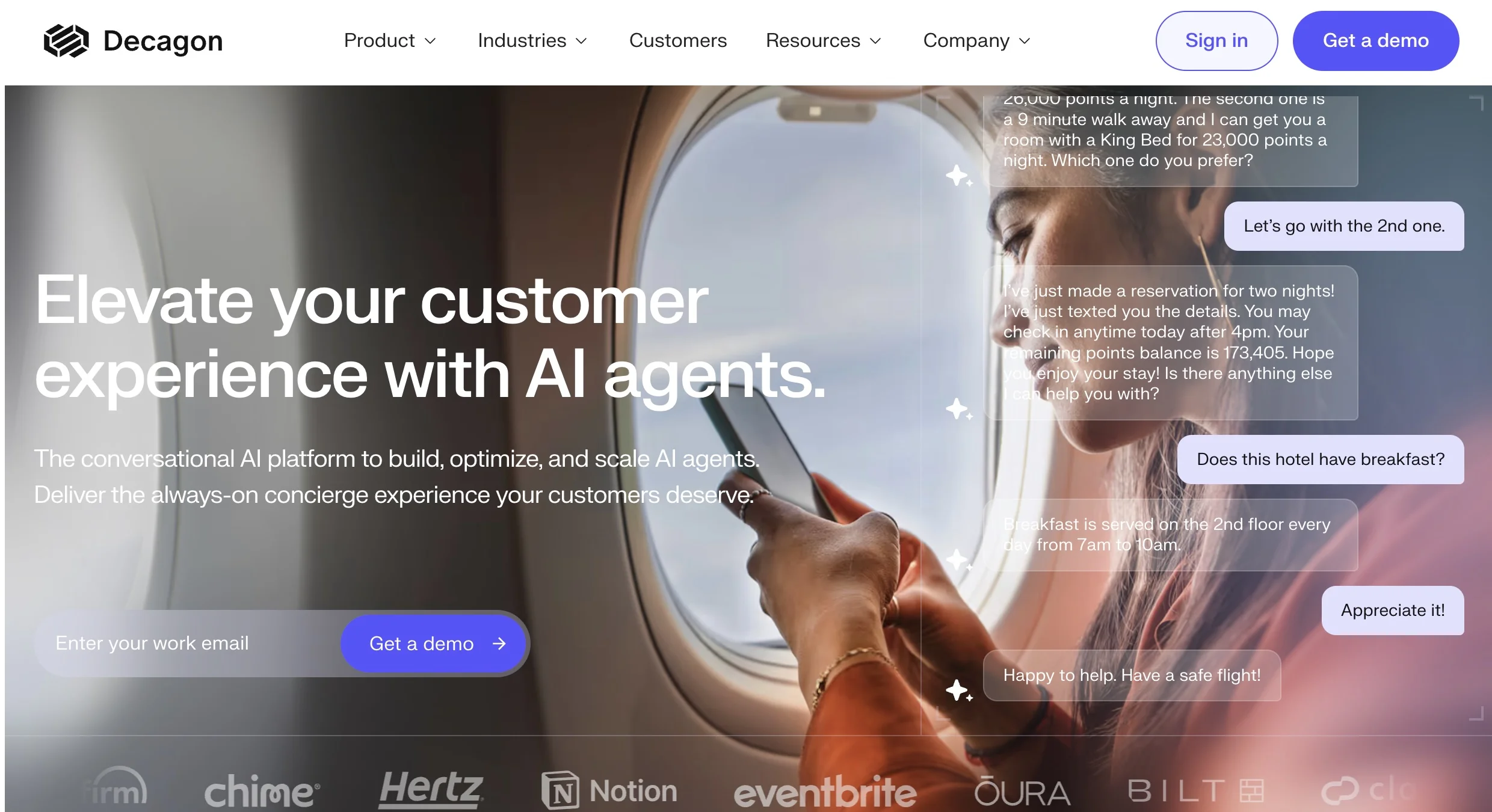
Decagon.ai offers a unified AI engine that auto-resolves customer issues across chat, voice, email, SMS, and custom channels in any language.
Their approach centers on Agent Operating Procedures (AOPs): natural-language instructions that compile into logic, letting teams build dynamic AI appointment setters that interact with calendars and CRMs without extra coding.
Advantages Compared to PolyAI
- Agent Operating Procedures for logic via natural language: Decagon lets CX or ops teams define conversational rules using natural language instructions that compile to code, giving more flexibility and readability than rigid decision trees. Decagon also enables the creation of custom ai agents, allowing teams to tailor agent behavior to specific enterprise requirements.
- Hyper-realistic voice + continuity across channels: Their “Decagon Voice” supports natural dialogue, smooth interruptions, and shared conversational context across voice, chat, SMS, and email, all using the same “brain.” Decagon leverages generative ai to deliver more human-like, empathetic, and multi-turn interactions.
- Unified omnichannel logic and memory: Because the same workflows, knowledge, and decision logic drive chat, voice, and email, Decagon avoids silos in conversational experience that a voice-centric system like PolyAI might produce.
- Full observability and auditability: Decagon offers traceability, visibility into how and why an AI agent made its decisions, with logs, versioning, and testing before deployment.
- Autonomous, action-oriented agents with integration depth: Their agents not only converse, but trigger backend workflows, call APIs, and interact with internal systems to fulfill tasks rather than just answering queries. Decagon supports deep customization for enterprise needs, giving engineering teams advanced modular control.
Pricing
Decagon frames pricing around value. Their two main tiers are:
- Per-conversation pricing: You pay a flat fee per interaction (whether fully resolved or not). This is the more commonly chosen model among their customers.
- Per-resolution pricing: You only pay when the AI fully resolves a query without escalation. No cost for conversations that require human handoff.
Because Decagon is aimed at enterprise clients with large volumes, their base pricing is custom. Custom pricing is determined based on volume and complexity, allowing for tailored solutions that meet unique business needs. In one public review, estimated ranges span $95,000 to $590,900+ per year, depending on complexity, volume, and integrations.
G2 Rating: 4.9/5 (18 reviews)
Review: “The biggest upside of using Decagon isn’t simply the assumption of repetitive day-to-day tasks that would normally be done manually, but that Decagon allows us to evaluate data on a much deeper level.”
Recommended for:
Organizations that demand high customization, transparency, and outcome-driven automation, especially in sectors like fintech, telecom, or SaaS with large support loads.
Pros
- Agent Operating Procedures allow teams to define AI behavior using natural language instructions.
- Unified omnichannel memory ensures consistent customer experience across voice, chat, SMS, and email.
- Highly realistic voice interactions with support for interruptions and conversational continuity.
Cons
- Enterprise pricing and operational complexity may be excessive for smaller teams.
- Relatively new platform with limited long-term case studies.
- Backend integrations typically require technical setup and configuration.
11. ElevenLabs
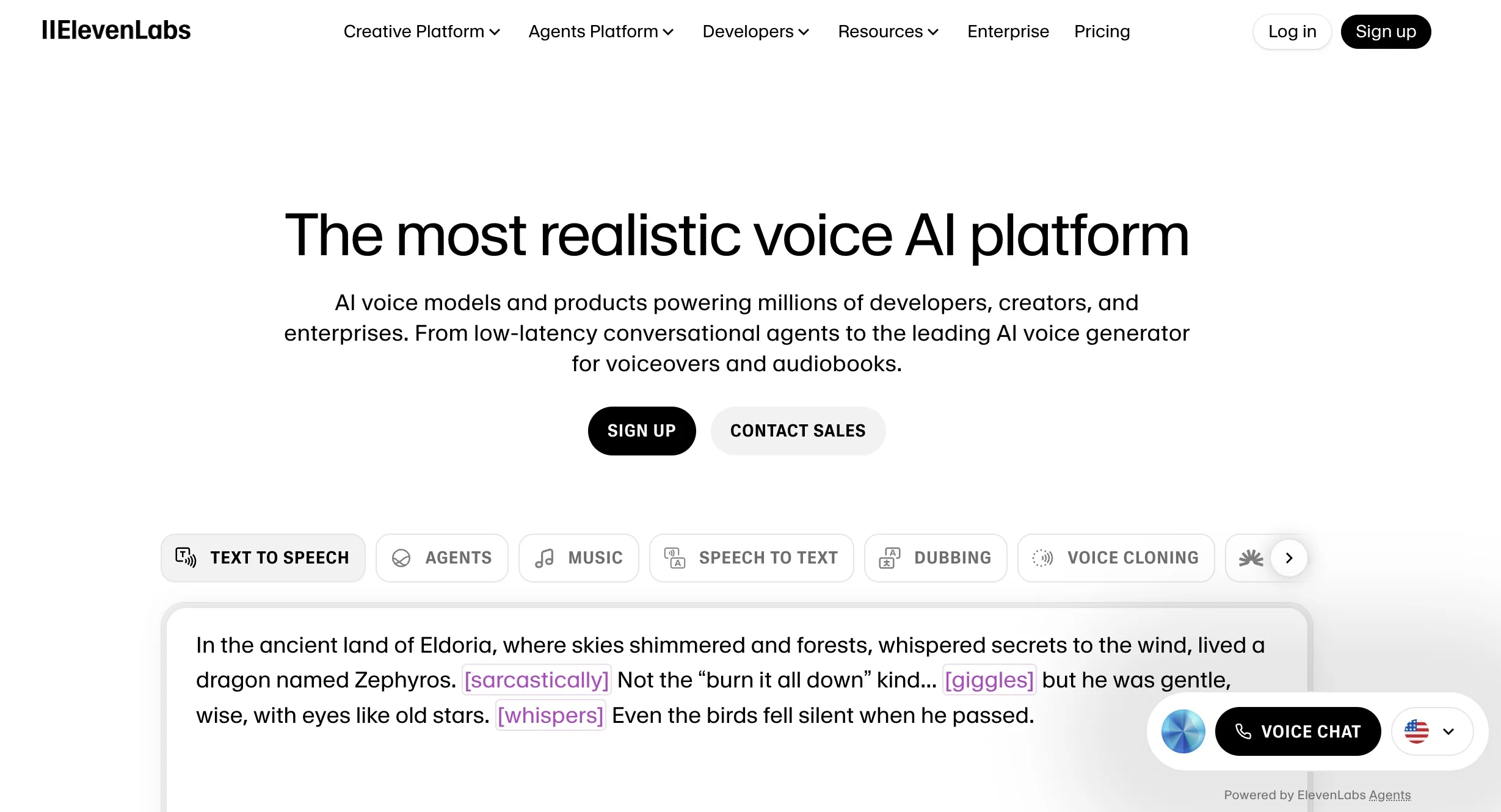
ElevenLabs is best known for its world-class text-to-speech and voice cloning tech, and more recently it’s expanded into conversational AI agents. Their platform can take user input (voice or text), ground it in your data, and produce natural spoken replies.
It’s not yet a full-blown telephony agent system, but it bridges content and voice interaction nicely, especially for brands already working in audio, narration, or voice experiences.
Advantages compared to PolyAI
- Ultra-realistic voices & emotional depth: ElevenLabs supports expressive models (e.g. “Eleven v3”) that infuse emotion, tone, pacing, and natural inflections, giving speech synthesis a more lifelike, human character. This enables natural conversations and human-like conversations, making interactions feel more personal and engaging.
- Instant voice cloning & customization: With ElevenLabs you can clone a voice from just a few samples (Instant Voice Cloning API) and use that clone in TTS systems.
- Low latency & real-time streaming models: Their “Flash v2.5” model delivers speech with very low latency (~ 75ms), making it ideal for conversational/interactive use cases.
- Wide voice library & language support: ElevenLabs gives access to a large catalog of voices and supports dozens of languages, enabling richer multilingual voice experiences out-of-the-box.
- Advanced technology features: ElevenLabs leverages advanced AI models and advanced natural language processing to deliver sophisticated, context-aware voice synthesis and conversational AI capabilities.
Pricing
ElevenLabs uses a credit system. You get a bundle of credits (usable for TTS, agents, etc.), and if you exceed them, you buy more.
Example tiers (as of now):
- Free: 10,000 credits / month (≈10 minutes of high-quality TTS or 15 minutes of agent use)
- Starter: $5/month for 30,000 credits
- Creator / Pro / Business / Enterprise: stepping up to 100k, 500k, millions of credits with higher-quality audio, API priority, SLA, etc.
Because it’s usage-based, your total cost will depend heavily on how many agent minutes you use, how much audio you generate, and how premium the voices are.
Recommended for:
If your product or brand already has a voice or audio focus (podcasts, narration, gaming, or voice apps) and you want to layer in conversational agents, ElevenLabs is a powerful pick. It’s especially strong when you care deeply about sound quality, expressiveness, and voice branding. But if your priority is full telephony integration, call switching, deep voice workflows, or super predictable pricing, PolyAI (or others) might still lead in those domains.
Pros
- Industry-leading text-to-speech quality with highly expressive, human-like voices that enhance conversational realism.
- Instant voice cloning and deep customization enable strong voice branding from minimal audio samples.
- Low-latency, real-time streaming models support interactive and conversational voice experiences.
Cons
- Not a telephony-native platform; lacks built-in call routing, IVR replacement, and contact center workflows.
- Usage-based credit pricing can become unpredictable at higher conversational volumes.
- Requires external tools or infrastructure for end-to-end voice agent deployment on phone systems.
Why We Recommend Retell AI
PolyAI is still one of the most impressive players in the enterprise voice AI space. Its lifelike conversations, multilingual coverage, and strong reliability make it an obvious choice for large organizations. But as we’ve seen across multiple deployments, that same enterprise focus can make things slower, pricier, and harder to iterate when your team needs to move fast.
That’s exactly why Retell AI stands out. It’s purpose-built for real-time voice automation with sub-second latency, a no-code builder that anyone can use, and transparent, pay-as-you-go pricing. Retell gives you full control over customization, LLM choice, and telephony integrations, without sacrificing speed or compliance.
From my experience comparing dozens of platforms, Retell consistently delivers the best mix of performance, flexibility, and clarity. While tools like Synthflow, Cognigy, or Kore.ai shine in their own niches, Retell hits the sweet spot: fast enough for startups, robust enough for enterprises, and simple enough for teams that just want to build, test, and launch without friction.
If I had to choose one platform to recommend as the next step beyond PolyAI, Retell AI would be it, the voice platform that actually keeps up with how modern teams build and scale in 2025.
See how much your business could save by switching to AI-powered voice agents.
Your submission has been sent to your email
ROI Result
Total Human Agent Cost
AI Agent Cost
Estimated Savings
A Demo Phone Number From Retell Clinic Office

